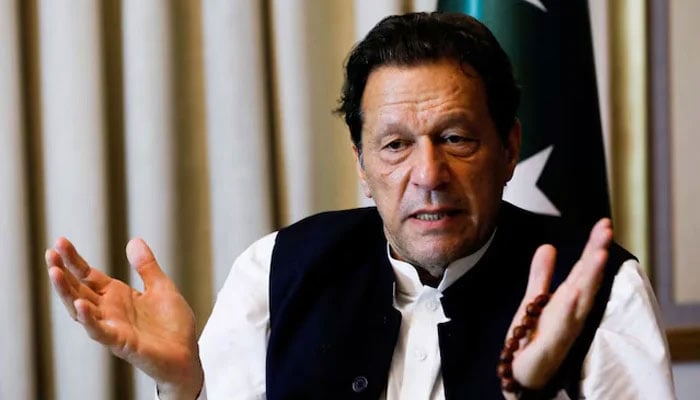Back to civil disobedience
Imran forms negotiation team to put forward two demands to federal government
Pakistan is living through its own bizarre version of Groundhog Day. In the latest, PTI founder chairman Imran Khan has issued a warning to the government that if his party’s demands are not accepted, a civil disobedience movement will be launched from December 14. Khan has formed a five-member negotiation team, comprising Omar Ayub Khan, Ali Amin Gandapur, Sahibzada Hamid Raza, Salman Akram Raja, and Asad Qaiser, to put forward two demands to the federal government: the release of “political prisoners” facing trial and the constitution of a judicial commission to probe the events of May 9, 2023, and a late-night crackdown on PTI protesters on November 26. With this recent threat, the PTI has come full circle – right back to 2014, when Imran Khan urged citizens to withhold taxes and utility payments. History, however, suggests that such strategies rarely yield meaningful results, and their implications for Pakistan’s international standing could be dire. While the PTI has constituted its negotiation team, the tone of the party’s approach suggests more confrontation than compromise.
The ramifications of such calls are not limited to domestic politics. When a former prime minister of a major political party advocates actions that include circumventing formal banking channels, the global community is bound to raise an eyebrow. Pakistan’s hard-fought removal from the Financial Action Task Force’s (FATF) grey list in October 2022 is still a rather fresh memory. This achievement required years of meticulous work to address issues of terror financing and money laundering – issues India had weaponised against Pakistan on international platforms. Imran’s rhetoric risks undoing this progress, casting Pakistan once again as a nation unable to meet international financial standards. This latest threat could also be seen as coming from a sense of political desperation. Economic indicators, including a rise in remittances, show tentative stability. Does this pose a challenge to the PTI’s narrative of governmental incompetence? A recovering economy diminishes the pressure on the federal government to yield to the PTI’s demands. Could the civil disobedience threat be an attempt to regain lost leverage?
The fact however is that such measures not only risk destabilising the economy further but also alienate potential allies in government. PTI leader Shah Mahmood Qureshi’s plea for a “conducive environment” for dialogue rings hollow when juxtaposed with his party’s aggressive posturing. The government is unlikely to view threats of civil disobedience as an invitation to negotiate. The path forward for Imran Khan and his party is clear: dialogue, not disruption. The challenges Pakistan faces – be they political, economic, or social – demand a level of stability that the PTI’s current tactics undermine. Negotiation and compromise may not bring immediate gratification, but they remain the only viable way forward in a polarised political landscape. For a leader who has long championed the mantra of ‘justice and accountability’, it must surely be obvious that these principles also require responsibility. Civil disobedience, particularly in an already fragile state, is not an act of defiance but one of recklessness. Pakistan today needs solutions, not slogans and it is high time the PTI recalibrated its strategy and prioritised people over politics.
-
 Super Bowl 2026 Live: Seahawks Lead Patriots 3-0 After Defensive First Quarter
Super Bowl 2026 Live: Seahawks Lead Patriots 3-0 After Defensive First Quarter -
 Bad Bunny's Super Bowl Halftime Show: What Time Will He Perform Tonight?
Bad Bunny's Super Bowl Halftime Show: What Time Will He Perform Tonight? -
 Where Is Super Bowl 2026 Taking Place? Everything To Know About The NFL Showdown
Where Is Super Bowl 2026 Taking Place? Everything To Know About The NFL Showdown -
 Drake 'turns Down' Chance To Hit Back At Kendrick Lamar At Super Bowl
Drake 'turns Down' Chance To Hit Back At Kendrick Lamar At Super Bowl -
 Sarah Ferguson Had A ‘psychosexual Network’ With Jeffrey Epstein
Sarah Ferguson Had A ‘psychosexual Network’ With Jeffrey Epstein -
 Czech Republic Supports Social Media Ban For Under-15
Czech Republic Supports Social Media Ban For Under-15 -
 Khloe Kardashian Shares How She And Her Sisters Handle Money Between Themselves
Khloe Kardashian Shares How She And Her Sisters Handle Money Between Themselves -
 Prince William Ready To End 'shielding' Of ‘disgraced’ Andrew Amid Epstein Scandal
Prince William Ready To End 'shielding' Of ‘disgraced’ Andrew Amid Epstein Scandal -
 Chris Hemsworth Hailed By Halle Berry For Sweet Gesture
Chris Hemsworth Hailed By Halle Berry For Sweet Gesture -
 Blac Chyna Reveals Her New Approach To Love, Healing After Recent Heartbreak
Blac Chyna Reveals Her New Approach To Love, Healing After Recent Heartbreak -
 Royal Family's Approach To Deal With Andrew Finally Revealed
Royal Family's Approach To Deal With Andrew Finally Revealed -
 Super Bowl Weekend Deals Blow To 'Melania' Documentary's Box Office
Super Bowl Weekend Deals Blow To 'Melania' Documentary's Box Office -
 Meghan Markle Shares Glitzy Clips From Fifteen Percent Pledge Gala
Meghan Markle Shares Glitzy Clips From Fifteen Percent Pledge Gala -
 Melissa Jon Hart Explains Rare Reason Behind Not Revisting Old Roles
Melissa Jon Hart Explains Rare Reason Behind Not Revisting Old Roles -
 Meghan Markle Eyeing On ‘Queen’ As Ultimate Goal
Meghan Markle Eyeing On ‘Queen’ As Ultimate Goal -
 Japan Elects Takaichi As First Woman Prime Minister After Sweeping Vote
Japan Elects Takaichi As First Woman Prime Minister After Sweeping Vote




